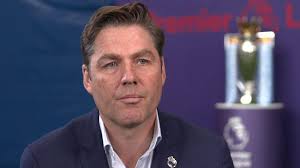By Paul Nicholson
April 22 – With the European Super League dead in the water, at least in its latest incarnation, the Premier League has wasted no time in moving on the management of the renegade six clubs, stripping them of key positions on key Premier League committees and working groups.
Premier League chief executive Richard Masters (pictured) reportedly asked them to step down yesterday, the day after they had all dramatically announced they were withdrawing from the ESL.
It is the second time England’s Big 6 have attempted a money and power grab. Last October ‘Project Big Picture’ was launched by the ‘big-6’ – Arsenal, Chelsea, Tottenham Hotspur, Liverpool, and the two Manchester clubs – with the intention of centralising power amongst themselves and an addition three special status clubs (the three longest serving Premier League clubs – West Ham, Everton and Southampton). The sweetener in that covid-induced play was a pay-off to the EFL of £250 million for its clubs to compensate for loss of match day revenue, and a £100 million carrot to the FA. The plan would have seen a reduction of the Premier League to 18 teams and a redistribution of broadcast revenues.
The fall out from the failure of project Big Picture was a concessionary approach to a strategic review within the Premier League.
This time round the wounds and sense of betrayal by the six big clubs – not just from the Premier League and its clubs but other football stakeholders, government and most importantly fans across the country – will not be met with the same concessions.
The strategic review now looks to have a limited lifespan with reports that 14 clubs are keen to kill it off completely.
Manchester City chief executive Ferran Soriano and Arsenal’s Vinai Venkatesham, key members of the Club Strategic Advisory Group which has been tasked with a strategic review, have been removed from the working group.
The Premier League also wants Liverpool’s Tom Werner and Manchester United’s Ed Woodward off its Broadcast Advisory board.
Another early leaver through the committee room door looks to be Chelsea chairman Bruce Buck who has been stripped of his position on the Premier League’s nominations and remuneration committee. Buck has also had to face the wrath of Chelsea fans who have chosen to go after him as the more public face of the club than owner Roman Abramovich.
See: Project Big Picture starts to get foggy as anger rises over Covid power grab
The UK government has said that its fan-led review of football, announced on Monday, would still go ahead. For the Premier League’s Big 6 this is likely to heap further embarrassment on clubs that outside the boardroom often genuinely try to work hard for their local communities.
That fan review will inevitably have social responsibility and accountability at its core and could push the government towards a re-regulation of club ownership towards the German 50+1 ownership model that gives supporters an oversight and ultimately a veto over potentially despotic shareholders and other private equity interests.
That would be an extreme and difficult legislation to impose given the UK’s relatively open business ownership laws, but there is certainly an appetite from within government to ensure that the social fabric of England’s national game is ring-fenced and that fans are accepted as stakeholders and not just consumers.
But even that fan-led review has challenges. On Monday UK prime minister Boris Johnson invited the chair of the Football Supporters Association, the chair of the Arsenal Supporters Trust and chair of the Spirit of Shankly (Liverpool supporters body), to an online meeting.
Liverpool declined saying that they would not meet with someone that refused to provide food for kids in poverty, oversaw the disastrous reaction to covid, wrote a column in the Sun newspaper the day a new Hillsborough trial started and was the Editor of the Spectator when they wrote about Liverpool fans causing Hillsborough and being full of self pity.
The Liverpool group recognised that a political response is good to go along with fan protests and sponsor boycotts and they would take part in cross-party meetings with sports ministers, but not with someone treating it as a publicity stunt so he can say he is working with supporters.
The emotional and political depth of this communication to government, and its social message, is what owners of all football clubs need to understand, wherever they are in Europe – most do. Liverpool fans aren’t alone in this as there is a much bigger social fundamental. While big money corporations might have paperwork telling them they own the clubs, the reality in this increasingly virtual world is that actually don’t. The last three days have again proved that. And if these owners aren’t capable of being good global and football citizens, then they will be made to be.
Contact the writer of this story at moc.l1713593030labto1713593030ofdlr1713593030owedi1713593030sni@n1713593030osloh1713593030cin.l1713593030uap1713593030

